formerly eScholarship Editions


|
|
|
|
Your request for similar items found 20 book(s). | Modify Search | Displaying 1 - 20 of 20 book(s) | |
| 1. | 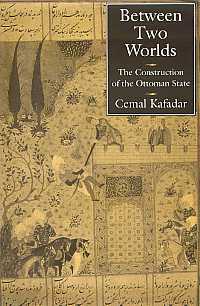 | Title: Between two worlds: the construction of the Ottoman state Author: Kafadar, Cemal 1954- Published: University of California Press, 1995 Subjects: History | Politics | Middle Eastern History | Middle Eastern Studies | Medieval History | Medieval Studies Publisher's Description: Cemal Kafadar offers a much more subtle and complex interpretation of the early Ottoman period than that provided by other historians. His careful analysis of medieval as well as modern historiography from the perspective of a cultural historian demonstrates how ethnic, tribal, linguistic, religious, and political affiliations were all at play in the struggle for power in Anatolia and the Balkans during the late Middle Ages.This highly original look at the rise of the Ottoman empire - the longest-lived political entity in human history - shows the transformation of a tiny frontier enterprise into a centralized imperial state that saw itself as both leader of the world's Muslims and heir to the Eastern Roman Empire. [brief] Similar Items |
| 2. | 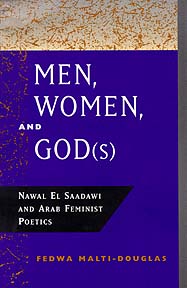 | Title: Men, women, and God(s): Nawal El Saadawi and Arab feminist poetics Author: Malti-Douglas, Fedwa Published: University of California Press, 1995 Subjects: Literature | Middle Eastern Studies | Gender Studies | Women's Studies Publisher's Description: Men, Women, and God(s) is a pioneering study of the Arab world's leading feminist and most controversial woman writer, Nawal El Saadawi. Author of plays, memoirs, and such novels as Woman at Point Zero and The Innocence of the Devil , El Saadawi has become well known in the West as well as in the Arab community for her unforgettable female heroes and explosive narratives, which boldly address sexual violence, female circumcision, theology, and other politically charged themes. Her outspoken feminism and critique of patriarchy have also earned her the wrath of repressive forces in the Middle East. Imprisoned in her native Egypt under Sadat, El Saadawi is now among those on the death lists of Islamic religious conservatives.In Men, Women, and God(s) Fedwa Malti-Douglas makes the work of this important but little-understood writer truly accessible. Contending that El Saadawi's texts cannot be read in isolation from their Islamic and Arabic heritage, Malti-Douglas draws upon a deep knowledge of classical and modern Arabic textual traditions - and on extensive conversations with Nawal El Saadawi - to place the writer within her cultural and historical context. With this impassioned and radical exegesis of El Saadawi's prolific output, Malti-Douglas has written a crucial study of one of the most controversial and influential writers of our time. [brief] Similar Items |
| 3. | 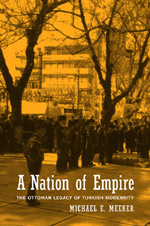 | Title: A nation of empire: the Ottoman legacy of Turkish modernity Author: Meeker, Michael E Published: University of California Press, 2002 Subjects: Anthropology | Middle Eastern Studies | Cultural Anthropology | Middle Eastern History Publisher's Description: This innovative study of modern Turkey is the result of many years of ethnographic fieldwork and archival research. Michael Meeker expertly combines anthropological and historical methods to examine the transition from the Ottoman Empire to the Turkish Republic in a major region of the country, the eastern Black Sea coast. His most significant finding is that a state-oriented provincial oligarchy played a key role in successive programs of reform over the course of more than two hundred years of imperial and national history. As Meeker demonstrates, leading individuals backed by interpersonal networks determined the outcome of the modernizing process, first during the westernizing period of the Empire, then during the revolutionary period of the Republic.To understand how such a state-oriented provincial oligarchy was produced and reproduced along the eastern Black Sea coast, Meeker integrates a contemporary ethnographic study of public life in towns and villages with a historical study of official documents, consular reports, and travel narratives. A Nation of Empire provides anthropologists, historians, and students of Eastern Europe and the Middle East with a new understanding of the complexities and contradictions of modern Turkish experience. [brief] Similar Items |
| 4. | 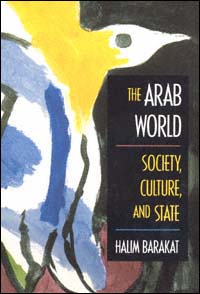 | Title: The Arab world: society, culture, and state Author: Barakat, Halim Isber Published: University of California Press, 1993 Subjects: Sociology | Politics | Sociology Publisher's Description: This wide-ranging examination of Arab society and culture offers a unique opportunity to know the Arab world from an Arab point of view. Halim Barakat, an expatriate Syrian who is both scholar and novelist, emphasizes the dynamic changes and diverse patterns that have characterized the Middle East since the mid-nineteenth century.The Arab world is not one shaped by Islam, nor one simply explained by reference to the sectarian conflicts of a "mosaic" society. Instead, Barakat reveals a society that is highly complex, with many and various contending polarities. It is a society in a state of becoming and change, one whose social contradictions are at the root of the struggle to transcend dehumanizing conditions. Arguing from a perspective that is both radical and critical, Barakat is committed to the improvement of human conditions in the Arab world. [brief] Similar Items |
| 5. | 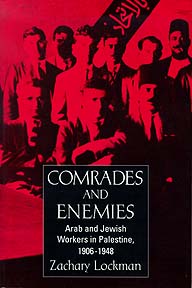 | Title: Comrades and enemies: Arab and Jewish workers in Palestine, 1906-1948 Author: Lockman, Zachary Published: University of California Press, 1996 Subjects: History | Middle Eastern History Publisher's Description: In Comrades and Enemies Zachary Lockman explores the mutually formative interactions between the Arab and Jewish working classes, labor movements, and worker-oriented political parties in Palestine just before and during the period of British colonial rule. Unlike most of the historical and sociological literature on Palestine in this period, Comrades and Enemies avoids treating the Arab and Jewish communities as if they developed independently of each other. Instead of focusing on politics, diplomacy, or military history, Lockman draws on detailed archival research in both Arabic and Hebrew, and on interviews with activists, to delve into the country's social, economic, and cultural history, showing how Arab and Jewish societies in Palestine helped to shape each other in significant ways. Comrades and Enemies presents a narrative of Arab-Jewish relations in Palestine that extends and complicates the conventional story of primordial identities, total separation, and unremitting conflict while going beyond both Zionist and Palestinian nationalist mythologies and paradigms of interpretation. [brief] Similar Items |
| 6. | 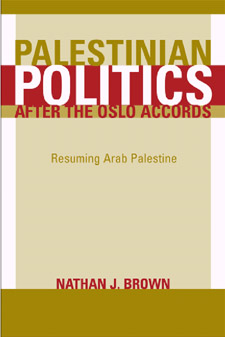 | Title: Palestinian politics after the Oslo Accords: resuming Arab Palestine Author: Brown, Nathan J Published: University of California Press, 2003 Subjects: History | Middle Eastern History | Middle Eastern Studies | Politics Publisher's Description: This timely and critically important work does what hostilities in the Middle East have made nearly impossible: it offers a measured, internal perspective on Palestinian politics, viewing emerging political patterns from the Palestinian point of view rather than through the prism of the Arab-Israeli conflict. Based on groundbreaking fieldwork, interviews with Palestinian leaders, and an extensive survey of Arabic-language writings and documents, Palestinian Politics after the Oslo Accords presents the meaning of state building and self-reliance as Palestinians themselves have understood them in the years between 1993 and 2002. Nathan J. Brown focuses his work on five areas: legal development, constitution drafting, the Palestinian Legislative Council, civil society, and the effort to write a new curriculum. His book shows how Palestinians have understood efforts at building institutions as acts of resumption rather than creation - with activists and leaders seeing themselves as recovering from an interrupted past, Palestinians seeking to rejoin the Arab world by building their new institutions on Arab models, and many Palestinian reformers taking the Oslo Accords as an occasion to resume normal political life. Providing a clear and urgently needed vantage point on most of the issues of Palestinian reform and governance that have emerged in recent policy debates - issues such as corruption, constitutionalism, democracy, and rule of law - Brown's book helps to put Palestinian aspirations and accomplishments in their proper context within a long and complex history and within the larger Arab world. [brief] Similar Items |
| 7. | 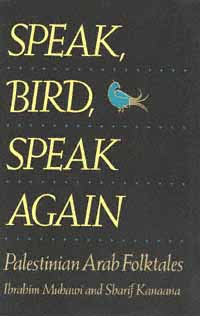 | Title: Speak, bird, speak again: Palestinian Arab folktales Author: Muhawi, Ibrahim 1937- Published: University of California Press, 1989 Subjects: Anthropology | Literature in Translation | Middle Eastern Studies | Folklore and Mythology Publisher's Description: Were it simply a collection of fascinating, previously unpublished folktales, Speak, Bird, Speak Again: Palestinian Arab Folktales would merit praise and attention because of its cultural rather than political approach to Palestinian studies. But it is much more than this. By combining their respective expertise in English literature and anthropology, Ibrahim Muhawi and Sharif Kanaana bring to these tales an integral method of study that unites a sensitivity to language with a deep appreciation for culture.As native Palestinians, the authors are well-suited to their task. Over the course of several years they collected tales in the regions of the Galilee, Gaza, and the West Bank, determining which were the most widely known and appreciated and selecting the ones that best represented the Palestinian Arab folk narrative tradition. Great care has been taken with the translations to maintain the original flavor, humor, and cultural nuances of tales that are at once earthy and whimsical. The authors have also provided footnotes, an international typology, a comprehensive motif index, and a thorough analytic guide to parallel tales in the larger Arab tradition in folk narrative. Speak, Bird, Speak Again is an essential guide to Palestinian culture and a must for those who want to deepen their understanding of a troubled, enduring people. [brief] Similar Items |
| 8. | 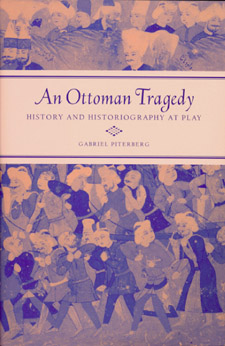 | Title: An Ottoman tragedy: history and historiography at play Author: Piterberg, Gabriel 1955- Published: University of California Press, 2003 Subjects: History | Middle Eastern History | Historiography | Middle Eastern Studies Publisher's Description: In the space of six years early in the seventeenth century, the Ottoman Empire underwent such turmoil and trauma - the assassination of the young ruler Osman II, the re-enthronement and subsequent abdication of his mad uncle Mustafa I, for a start - that a scholar pronounced the period's three-day-long dramatic climax "an Ottoman Tragedy." Under Gabriel Piterberg's deft analysis, this period of crisis becomes a historical laboratory for the history of the Ottoman Empire in the seventeenth century - an opportunity to observe the dialectical play between history as an occurrence and experience and history as a recounting of that experience. Piterberg reconstructs the Ottoman narration of this fraught period from the foundational text, produced in the early 1620s, to the composition of the state narrative at the end of the seventeenth century. His work brings theories of historiography into dialogue with the actual interpretation of Ottoman historical texts, and forces a rethinking of both Ottoman historiography and the Ottoman state in the seventeenth century. A provocative reinterpretation of a major event in Ottoman history, this work reconceives the relation between historiography and history. [brief] Similar Items |
| 9. | 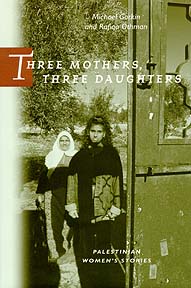 | Title: Three mothers, three daughters: Palestinian women's stories Author: Gorkin, Michael Published: University of California Press, 1996 Subjects: Middle Eastern Studies | Cultural Anthropology | Women's Studies | Sociology Publisher's Description: This remarkable collection of oral histories from six Palestinian women, three mothers and three of their daughters, affords an unparalleled view into the daily lives of women who have lived, and continue to live, through a turbulent and rapidly changing era. In recording these stories, Michael Gorkin and Rafiqa Othman have preserved each woman's distinctive voice, capturing in vivid and moving detail a broad range of experience - everything from recollections of native villages to an account of incarceration as a political prisoner. Highly personal events such as courting, marriage, and childbirth are interwoven with memories of upheavals such as the wars of 1948 and 1967. The women speak with surprising candor about conflicts between mothers and daughters, husbands and wives, men and women, Arabs and Jews. These beautifully written narratives bear witness to the power of Palestinian culture in sustaining the often difficult lives of women. The book also provides brilliant testimony to the experience of living in the midst of the Arab-Israeli conflict.Michael Gorkin, a Jewish-American psychologist who lives in Israel, and Rafiqa Othman, a Palestinian special education teacher, have collected the narratives from different cultural and geographic locations within the boundaries of historical Palestine - including East Jerusalem, a refugee camp on the West Bank, and an Arab village within Israel. With surprising intimacy, the mothers and daughters discuss their views about sex, marriage, and child-rearing; ideas about themselves and their relationship to God, their families, and their homeland; and questions of shame, devotion, freedom, and honor.In the preface, introduction and epilogue, Gorkin and Othman frame the stories and describe the project. The linked stories of mothers and daughters attest to the profound changes that have occurred in the lives of Palestinian women during this century - in the areas of education, work, political involvement and personal freedom. In addition to delineating this astonishing historical and cultural transformation, the stories create lasting images of the people these women have loved and hated, the pleasures they have enjoyed, the dangers they have survived, and the hopes they continue to cherish. [brief] Similar Items |
| 10. | 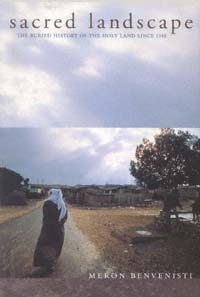 | Title: Sacred landscape: the buried history of the Holy Land since 1948 Author: Benvenisti, Meron 1934- Published: University of California Press, 2000 Subjects: Jewish Studies | Religion | Middle Eastern Studies | Politics Publisher's Description: As a young man Meron Benvenisti often accompanied his father, a distinguished geographer, when the elder Benvenisti traveled through the Holy Land charting a Hebrew map that would rename Palestinian sites and villages with names linked to Israel's ancestral homeland. These experiences in Benvenisti's youth are central to this book, and the story that he tells helps explain how during this century an Arab landscape, physical and human, was transformed into an Israeli, Jewish state.Benvenisti first discusses the process by which new Hebrew nomenclature replaced the Arabic names of more than 9,000 natural features, villages, and ruins in Eretz Israel/Palestine (his name for the Holy Land, thereby defining it as a land of Jews and Arabs). He then explains how the Arab landscape has been transformed through war, destruction, and expulsion into a flourishing Jewish homeland accommodating millions of immigrants. The resulting encounters between two peoples who claim the same land have raised great moral and political dilemmas, which Benvenisti presents with candor and impartiality.Benvenisti points out that five hundred years after the Moors left Spain there are sufficient landmarks remaining to preserve the outlines of Muslim Spain. Even with sustained modern development, the ancient scale is still visible. Yet a Palestinian returning to his ancestral landscape after only fifty years would have difficulty identifying his home. Furthermore, Benvenisti says, the transformation of Arab cultural assets into Jewish holy sites has engendered a struggle over the "signposts of memory" essential to both peoples. Sacred Landscape raises troublesome questions that most writers on the Middle East avoid. The now-buried Palestinian landscape remains a symbol and a battle standard for Palestinians and Israelis. But it is Benvenisti's continuing belief that Eretz Israel/Palestine has enough historical and physical space for the people of both nations and that it can one day be a shared homeland. [brief] Similar Items |
| 11. | 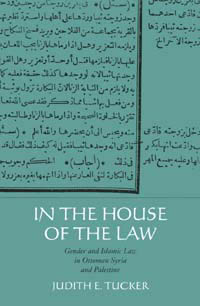 | Title: In the house of the law: gender and Islamic law in Ottoman Syria and Palestine Author: Tucker, Judith E Published: University of California Press, 1998 Subjects: History | Middle Eastern History | Law | Islam | Women's Studies | Middle Eastern Studies | Islam Publisher's Description: In an rewarding new study, Tucker explores the way in which Islamic legal thinkers understood Islam as it related to women and gender roles. In seventeenth and eighteenth century Syria and Palestine, Muslim legal thinkers gave considerable attention to women's roles in society, and Tucker shows how fatwa s, or legal opinions, greatly influenced these roles. She challenges prevailing views on Islam and gender, revealing Islamic law to have been more fluid and flexible than previously thought. Although the legal system had a consistent patriarchal orientation, it was modulated by sensitivities to the practical needs of women, men, and children. In her comprehensive overview of a field long neglected by scholars, Tucker deepens our understanding of how societies, including our own, construct gender roles. [brief] Similar Items |
| 12. | 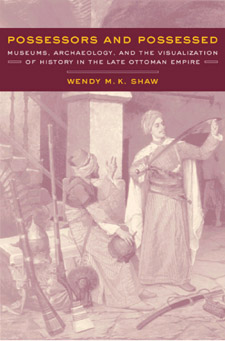 | Title: Possessors and possessed: museums, archaeology, and the visualization of history in the late Ottoman Empire Author: Shaw, Wendy M. K 1970- Published: University of California Press, 2003 Subjects: History | Middle Eastern Studies | Art | Middle Eastern History Publisher's Description: Possessors and Possessed analyzes how and why museums - characteristically Western institutions - emerged in the late-nineteenth-century Ottoman Empire. Shaw argues that, rather than directly emulating post-Enlightenment museums of Western Europe, Ottoman elites produced categories of collection and modes of display appropriate to framing a new identity for the empire in the modern era. In contrast to late-nineteenth-century Euro-American museums, which utilized organizational schema based on positivist notions of progress to organize exhibits of fine arts, Ottoman museums featured military spoils and antiquities long before they turned to the "Islamic" collections with which they might have been more readily associated. The development of these various modes of collection reflected shifting moments in Ottoman identity production. Shaw shows how Ottoman museums were able to use collection and exhibition as devices with which to weave counter-colonial narratives of identity for the Ottoman Empire. Impressive for both the scope and the depth of its research, Possessors and Possessed lays the groundwork for future inquiries into the development of museums outside of the Euro-American milieu. [brief] Similar Items |
| 13. |  | Title: Intimate enemies: Jews and Arabs in a shared land Author: Benvenisti, Meron 1934- Published: University of California Press, 1995 Subjects: Politics | Middle Eastern Studies | Jewish Studies | Middle Eastern History Publisher's Description: As Israelis and Palestinians negotiate separation and division of their land, Meron Benvenisti, former Deputy Mayor of Jerusalem, maintains that any expectations for "peaceful partition" are doomed. In his brave and controversial new book, he raises the possibility of a confederation of Israel/Palestine, the only solution that he feels will bring lasting peace.The seven million people in the territory between Jordan and the Mediterranean are mutually dependent regarding employment, water, land use, ecology, transportation, and all other spheres of human activity. Each side, Benvenisti says, must accept the reality that two national entities are living within one geopolitical entity - their conflict is intercommunal and will not be resolved by population transfers or land partition.A geographer and historian by training, a man passionately rooted in his homeland, Benvenisti skillfully conveys the perspective of both Israeli and Palestinian communities. He recognizes the great political and ideological resistance to a confederation, but argues that there are Israeli Jews and Palestinians who can envision an undivided land, where attachment to a common homeland is stronger than militant tribalism and segregation in national ghettos. Acknowledging that equal coexistence between Israeli and Palestinian may yet be an impossible dream, he insists that such a dream deserves a place in the current negotiations."Meron Benvenisti is the Middle East expert to whom Middle East experts go for advice . . . the most oft-quoted and oft-damned analyst in Israel." - from the Foreword by Thomas L. Friedman [brief] Similar Items |
| 14. | 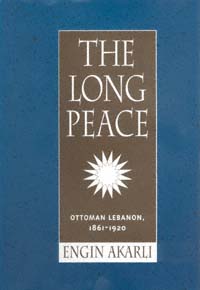 | Title: The long peace: Ottoman Lebanon, 1861-1920 Author: Akarlı, Engin Deniz Published: University of California Press, 1993 Subjects: History | Politics | Middle Eastern History | Middle Eastern Studies Publisher's Description: Long notorious as one of the most turbulent areas of the world, Lebanon nevertheless experienced an interlude of peace between its civil war of 1860 and the beginning of the French Mandate in 1920. Engin Akarli examines the sociopolitical changes resulting from the negotiations and shifting alliances characteristic of these crucial years.Using previously unexamined documents in Ottoman archives, Akarli challenges the prevailing view that attributes modernization in government to Western initiative while blaming stagnation on reactionary local forces. Instead, he argues, indigenous Lebanese experience in self-rule as well as reconciliation among different religious groups after 1860 laid the foundation for secular democracy. European intervention in Lebanese politics, however, hampered efforts to develop a correspondingly secular notion of Lebanese nationality.As ethnic and religious strife increases throughout much of eastern Europe and the Middle East, the Lebanese example has obvious relevance for our own time. [brief] Similar Items |
| 15. | 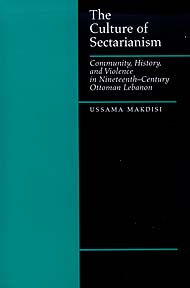 | Title: The culture of sectarianism: community, history, and violence in nineteenth-century Ottoman Lebanon Author: Makdisi, Ussama Samir 1968- Published: University of California Press, 2000 Subjects: History | Middle Eastern History | Middle Eastern Studies | Postcolonial Studies | Islam | Cultural Anthropology Publisher's Description: Focusing on Ottoman Lebanon, Ussama Makdisi shows how sectarianism was a manifestation of modernity that transcended the physical boundaries of a particular country. His study challenges those who have viewed sectarian violence as an Islamic response to westernization or simply as a product of social and economic inequities among religious groups. The religious violence of the nineteenth century, which culminated in sectarian mobilizations and massacres in 1860, was a complex, multilayered, subaltern expression of modernization, he says, not a primordial reaction to it. Makdisi argues that sectarianism represented a deliberate mobilization of religious identities for political and social purposes. The Ottoman reform movement launched in 1839 and the growing European presence in the Middle East contributed to the disintegration of the traditional Lebanese social order based on a hierarchy that bridged religious differences. Makdisi highlights how European colonialism and Orientalism, with their emphasis on Christian salvation and Islamic despotism, and Ottoman and local nationalisms each created and used narratives of sectarianism as foils to their own visions of modernity and to their own projects of colonial, imperial, and national development. Makdisi's book is important to our understanding of Lebanese society today, but it also makes a significant contribution to the discussion of the importance of religious discourse in the formation and dissolution of social and national identities in the modern world. [brief] Similar Items |
| 16. | 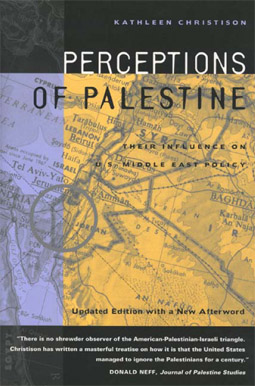 | Title: Perceptions of Palestine: their influence on U.S. Middle East policy Author: Christison, Kathleen 1941- Published: University of California Press, 1999 Subjects: Politics | Middle Eastern History | Middle Eastern Studies Publisher's Description: For most of the twentieth century, considered opinion in the United States regarding Palestine has favored the inherent right of Jews to exist in the Holy Land. That Palestinians, as a native population, could claim the same right has been largely ignored. Kathleen Christison's controversial new book shows how the endurance of such assumptions, along with America's singular focus on Israel and general ignorance of the Palestinian point of view, has impeded a resolution to the Arab-Israeli conflict. Christison begins with the derogatory images of Arabs purveyed by Western travelers to the Middle East in the nineteenth century, including Mark Twain, who wrote that Palestine's inhabitants were "abject beggars by nature, instinct, and education." She demonstrates other elements that have influenced U.S. policymakers: American religious attitudes toward the Holy Land that legitimize the Jewish presence; sympathy for Jews derived from the Holocaust; a sense of cultural identity wherein Israelis are "like us" and Arabs distant aliens. She makes a forceful case that decades of negative portrayals of Palestinians have distorted U.S. policy, making it virtually impossible to promote resolutions based on equality and reciprocity between Palestinians and Israelis. Christison also challenges prevalent media images and emphasizes the importance of terminology: Two examples are the designation of who is a "terrorist" and the imposition of place names (which can pass judgment on ownership). Christison's thoughtful book raises a final disturbing question: If a broader frame of reference on the Palestinian-Israeli conflict had been employed, allowing a less warped public discourse, might not years of warfare have been avoided and steps toward peace achieved much earlier? [brief] Similar Items |
| 17. | 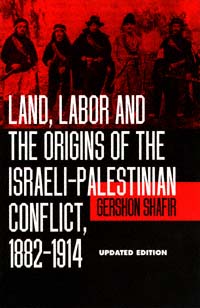 | Title: Land, labor and the origins of the Israeli-Palestinian conflict, 1882-1914 Author: Shafir, Gershon Published: University of California Press, 1996 Subjects: Middle Eastern Studies | Middle Eastern History | Labor Studies Publisher's Description: Gershon Shafir challenges the heroic myths about the foundation of the State of Israel by investigating the struggle to control land and labor during the early Zionist enterprise. He argues that it was not the imported Zionist ideas that were responsible for the character of the Israeli state, but t . . . [more] Similar Items |
| 18. | 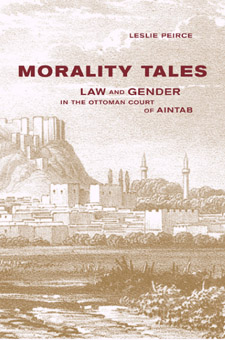 | Title: Morality tales: law and gender in the Ottoman court of Aintab Author: Peirce, Leslie P Published: University of California Press, 2003 Subjects: History | Middle Eastern Studies | Middle Eastern History | Gender Studies Publisher's Description: In this skillful analysis, Leslie Peirce delves into the life of a sixteenth-century Middle Eastern community, bringing to light the ways that women and men used their local law court to solve personal, family, and community problems. Examining one year's proceedings of the court of Aintab, an Anatolian city that had recently been conquered by the Ottoman sultanate, Peirce argues that local residents responded to new opportunities and new constraints by negotiating flexible legal practices. Their actions and the different compromises they reached in court influenced how society viewed gender and also created a dialogue with the ruling regime over mutual rights and obligations. Locating its discussion of gender and legal issues in the context of the changing administrative practices and shifting power relations of the period, Morality Tales argues that it was only in local interpretation that legal rules acquired vitality and meaning. [brief] Similar Items |
| 19. | 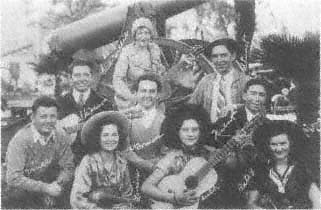 | Title: Workin' man blues: country music in California Author: Haslam, Gerald W Published: University of California Press, 1999 Subjects: Music | American Music | California and the West Publisher's Description: California has been fertile ground for country music since the 1920s, nurturing a multitude of talents from Gene Autry to Glen Campbell, Rose Maddox to Barbara Mandrell, Buck Owens to Merle Haggard. In this affectionate homage to California's place in country music's history, Gerald Haslam surveys the Golden State's contributions to what is today the most popular music in America. At the same time he illuminates the lives of the white, working-class men and women who migrated to California from the Dust Bowl, the Hoovervilles, and all the other locales where they had been turned out, shut down, or otherwise told to move on.Haslam's roots go back to Oildale, in California's central valley, where he first discovered the passion for country music that infuses Workin' Man Blues . As he traces the Hollywood singing cowboys, Bakersfield honky-tonks, western-swing dance halls, "hillbilly" radio shows, and crossover styles from blues and folk music that also have California roots, he shows how country music offered a kind of cultural comfort to its listeners, whether they were oil field roustabouts or hash slingers.Haslam analyzes the effects on country music of population shifts, wartime prosperity, the changes in gender roles, music industry economics, and television. He also challenges the assumption that Nashville has always been country music's hometown and Grand Ole Opry its principal venue. The soul of traditional country remains romantically rural, southern, and white, he says, but it is also the anthem of the underdog, which may explain why California plays so vital a part in its heritage: California is where people reinvent themselves, just as country music has reinvented itself since the first Dust Bowl migrants arrived, bringing their songs and heartaches with them. [brief] Similar Items |
| 20. | 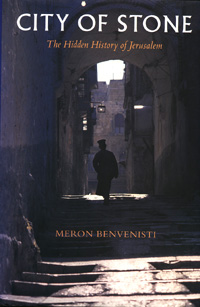 | Title: City of stone: the hidden history of Jerusalem Author: Benvenisti, Meron 1934- Published: University of California Press, 1996 Subjects: Politics | History | Jewish Studies | Middle Eastern History | Middle Eastern Studies Publisher's Description: Jerusalem is more than a holy city built of stone. Domain of Muslims, Jews, and Christians, Jerusalem is a perpetual contest, and its shrines, housing projects, and bulldozers compete in a scramble for possession. Now one of Jerusalem's most respected authorities presents a history of the city that does not fall prey to any one version of its past.Meron Benvenisti begins with a reflection on the 1996 celebration of Jerusalem's 3000-year anniversary as the capital of the Kingdom of Israel. He then juxtaposes eras, dynasties, and rulers in ways that provide grand comparative insights. But unlike recent politically motivated histories written to justify the claims of Jews and Arabs now living in Jerusalem, Benvenisti has no such agenda. His history is a polyphonic story that lacks victors as well as vanquished. He describes the triumphs and defeats of all the city's residents, from those who walk its streets today to the meddlesome ghosts who linger in its shadows.Benvenisti focuses primarily on the twentieth century, but ancient hatreds are constantly discovered just below the surface. These hostilities have created intense social, cultural, and political interactions that Benvenisti weaves into a compelling human story. For him, any claim to the city means recognizing its historical diversity and multiple populations.A native son of Jerusalem, Benvenisti knows the city well, and his integrated history makes clear that all of Jerusalem's citizens have enriched the Holy City in the past. It is his belief that they can also do so in the future. [brief] Similar Items |